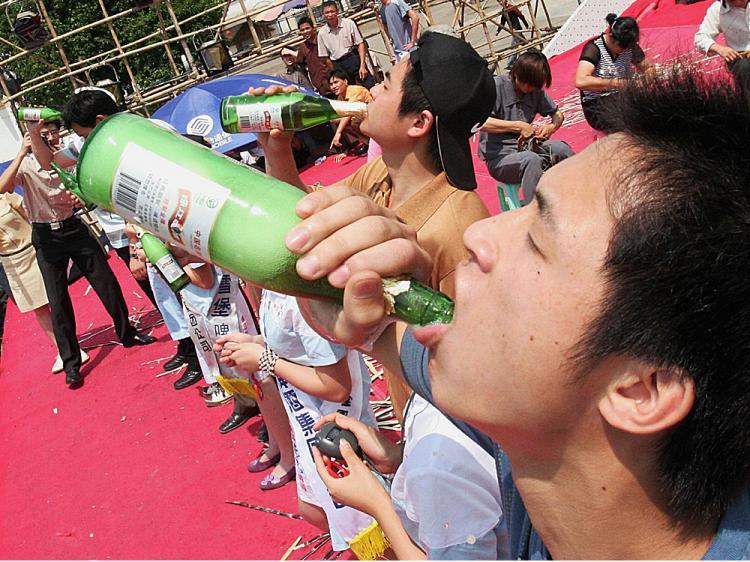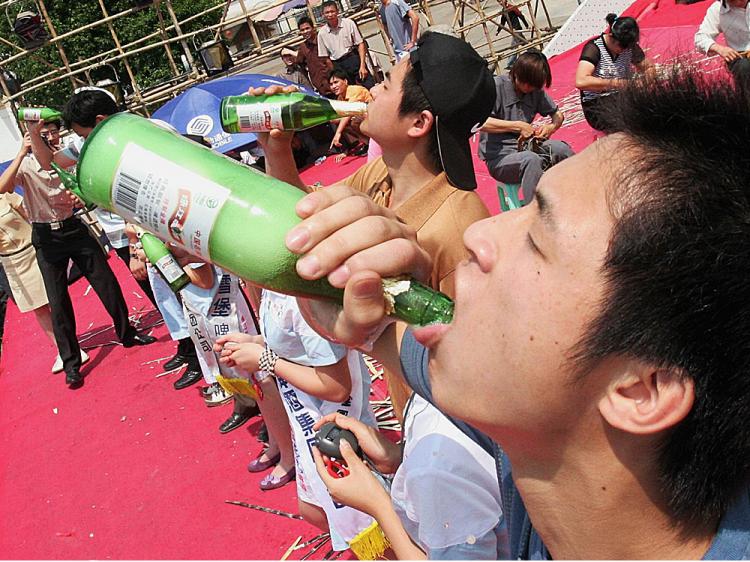While Chinese are aware of the negative side of drinking, such as traffic crashes or alcoholism, they express surprise that anyone would want to single out drinking for its problems.
ICAP issued a news release on October 2, regarding a newly published book, Swimming with Crocodiles: The Culture of Extreme Drinking. Edited by Marjana Martinic and Fiona Measham, “Swimming with Crocodiles” is the ninth volume in the ICAP Book Series on Alcohol in Society. The book discusses the factors that motivate “extreme” drinking—a term the authors and editors introduce to emphasize how the social environment influences excessive drinking.
It should be noted that ICAP is a not-for-profit organization and is supported by major international producers of alcohol beverages.
Chinese Youth Use Alcohol Differently Than Other Youth
“In China, alcohol consumption has been an integral part of daily life for centuries, perceived [for] the pleasures it provides rather than the problems it may cause,” writes the author of the China section, Ian Newman, professor of Health Education at the University of Nebraska.
“Few [Chinese] people consider alcohol use as a potentially risky behavior,” added Newman.
Besides the cultural and historical records, the author draws upon the comments made in focus groups by 49 young people, ages 18 to 28. Two of the focus groups were conducted in Beijing, one in Shanghai, and one in a rural setting in Inner Mongolia. The Chinese focus groups uncovered attitudes and behaviors that set the Chinese apart from other countries and continents.
While not a scientific sample representative of China’s youth and young adults, the focus groups can provide insights into the culture of youth drinking.
China: Drinking Perceived As Facilitating Friendship Through Communication
In addition to its health benefits, alcohol is viewed by young Chinese as conducive to communication and friendship. Here are some typical comments volunteered by the focus participants:
Alcohol can make you bold. Many people can speak out after drinking. Alcohol helps communication and allows people to speak in a more relaxed way.
The best thing about drinking is that it allows you to see each other’s hearts and make your relationship get closer.
“[D]rinking with family was the predominant consumption pattern among Chinese youth,” says Professor Newman. This is where most Chinese youth first learn to drink and what to expect from jiu—the Chinese word for all alcoholic beverages. Parents know young people will be expected to drink at parties and business settings and so they need to “practice” at home.
In many respects, the customs in China are similar to the drinking patterns in Italy, where the young are also introduced to alcohol in a family setting. Drinking is well integrated into everyday life and mostly occurs around meals rather than in bars and nightclubs. Very few young Italians in the focus groups reported getting drunk, and drunkenness in Italian society is frowned upon.
The perception is that drinking is for socializing with friends and family, and not for the purpose of just drinking. Like Chinese youth, Italian youth lacked awareness of the physical effects of drinking (such as blood alcohol levels) that impact driving safety.
In China, a person is more likely to drink at a restaurant than a bar, which are much less common than in the West.
Drinking Without Guilt
If alcohol is viewed in such a positive light, how do Chinese handle drinking when it goes to an extreme?
“In Chinese society, the rules are subtle, [and] complicated,” says Professor Newman. The context is important: what would be considered excessive drinking in the United States might be perceived as “normal,” “expected,” even “dutiful” in the eyes of the drinker. In fact, “extreme drinking” might not be perceived as bad at all, depending upon the circumstances.
The editors of the book, Drs. Marjana Martinic and Fiona Measham, introduce a new term—“extreme” drinking—to replace other descriptors used in the past, such as “binge” drinking. The latter term is defined quantitatively, but the number of drinks consumed at one occasion has little meaning to the Chinese who drink based on the “atmosphere” and situation.
The presence of “guilt” when indulging in alcohol is absent in China. Drinking a little is considered good and expected. “It is good for social relationships, enhancing friendship and camaraderie, showing respect, digesting food, and as a medicine,” says Professor Newman. Chinese youth among close friends will exert pressure on one another to drink more.
But then where are the limits? Losing self-control (dizziness, no control of limbs) are physical limits the young people in the focus groups mention. Vomiting is socially unacceptable, and represents one extreme. One is expected to exercise self-control, even when intoxicated.
“People who can drink large amounts of alcohol and maintain the appearance of sobriety are greatly admired,” notes Lawson.
On the other hand, not drinking enough was seen to be unacceptable in some situations. One must take care not to “ruin the atmosphere or the communication” or “threaten friendship or business relationships,” says Professor Lawson based on the focused groups’ comments.
A peculiar practice is the obligatory drinking required in business relations. “It has become common practice that business deals are negotiated and finalized with drinks,” says Lawson. One young person said, “You have to drink a full glass of alcohol to show your sincerity, even if you may get drunk.”
Extreme Drinking in Other Countries
The results of China were compared with the focus groups of young people from Brazil, China, Italy, Nigeria, Russia, South Africa, and the United Kingdom. In general, with the exception of Italy, the other nations’ drinking cultures were more hedonistic, tolerated riskier behavior, and were less integrated into the social fabric. Drinking alcohol acts more as an anti-social force in Nigeria, Russia, South Africa, and Scotland compared to Italy and China where it is, apparently, better integrated into everyday life.
“Extreme” drinking is more likely to lead to use of illegal drugs and negative behavior as well as risky behavior. In Russia, especially for persons under 25, excessive drinking was linked by the focus group to aggression (for example, fights), traffic accidents, and hooliganism. The experience seems to be a kind of rite of passage where a young man learns to overcome recklessness, and to cease the “wilder” kinds of behavior.
Participants in the focus group of South African youth said that often the young person deliberately intended to get drunk. The drinking pattern of going out with the intention of getting drunk was also common in Scotland and the United Kingdom, in general. This behavior is almost unheard of among Chinese youth.
Inebriated youth can lose reason as well. A male South African said:
“When I get drunk, I want to go swimming. … This is a stupid thing to do because there are crocodiles and hippos in the river, but you feel like you are invincible when you are drunk, so you do it. I do it.”
This story is how the book got its title.
The consensus of a South African focus group was that extreme drinking for youth was the norm and it carried its own social rewards—quite the opposite found in China.
Drinking alone is relatively rare with Chinese youth and more common in other nations.
It is well to keep in mind that these focus groups in China in 2007 take place in a setting for a young person growing up in a totalitarian country.
“With few exceptions, urban young people aged under 28 are the product of the one-child policy, having been raised without brothers and sisters, and with two parents and four grandparents to dote on them,” noted Professor Newman.
The rural areas have not partaken of the prosperity found in the large urban centers. A 20-year-old was only two when the Tiananmen Massacre occurred and would likely not have knowledge of what actually happened due to the Internet censorship and suppression of Tiananmen in the history lessons. So, the comments made in the focus groups in 2007 are expressed in a social and political vacuum. None of the other countries studied is under Communist Party authority, although Russia has retrograded in recent years from a democracy to a “not free” status, according to Freedom House.





